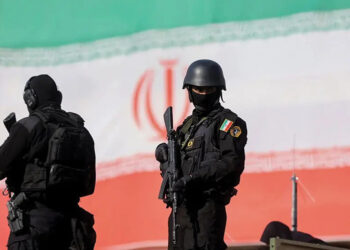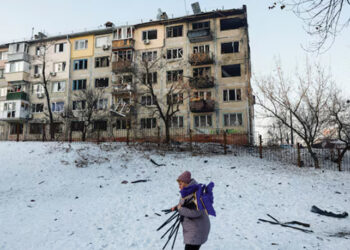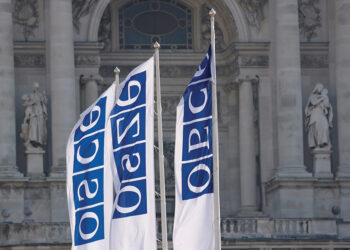Emergency evacuations are underway in parts of the southern Ukrainian region of Kherson as a major incident unfolds following damage to the Kakhovka Hydroelectric Power Plant dam.
Images and videos posted on social media by Ukraine President Volodymyr Zelensky and other officials show a massive surge of water heading through the damaged structure, putting thousands of residents downstream at risk.
Ukraine said the dam had been “blown up” by Russian forces Tuesday, with the South Command of Ukraine’s Armed Forces saying that “the scale of the destruction, the speed and volume of water, and the probable areas of flooding are being clarified.”
Damage to the Kakhovka dam has resulted in the flooding of 29 communities along the Dnipro river, Ukraine says. Thousands of people had been evacuated from their homes, and hundreds of thousands have no access to clean drinking water.
Ukraine has warned that it could take “years” for affected farmland to recover.
Russia denied damaging the dam, saying instead that Ukraine had “undermined the structure.” Vladimir Leontiev, the Russian-installed mayor of Nova Kakhovka, the city where the dam is located, said “night attacks” on the facility had “led to the destruction of the valves” and that “water from the Kakhovka reservoir began to be uncontrollably discharged downstream,” according to Russian state news agency Tass.
Russian response to flooding ‘exacerbating harm’ to civilians
Russian forces and authorities in occupied areas responded to flooding with “a great degree of disorganization” which exacerbated harm to civilians, according to the Institute for the Study of War, Sky news reported Thursday morning.
In its latest intelligence update, the US-based thinktank said there were reports that Russian military personnel purposefully prevented civilians from fleeing the floods.
Kherson’s Ukrainian administration adviser said that residents on the east bank of the Dnipro river, occupied by Russia, continue to shelter on their roofs for the third day with no food or water after Russian troops abandoned their positions and fled.
NATO chief calls attack on Kakhovka dam ‘outrageous’
NATO Secretary General Jens Stoltenberg slammed the attack on the Kakhovka dam in southern Ukraine on Twitter.
“This is an outrageous act, which demonstrates once again the brutality of Russia’s war in Ukraine,” the NATO chief wrote, adding that the attack puts “thousands of civilians at risk.”

White House working to provide additional support to Ukraine following dam attack
The White House said it was working with allies to provide Ukraine additional assistance following the destruction of the Kakhovka dam.
“The immediate focus is rightly on all the Ukrainians whose lives and towns and villages are affected by this flooding, and on making sure that they have the aid and assistance that they need,” National Security Council spokesman John Kirby told reporters at the White House.
Kirby added that it was “too soon to assess what kind of impact this is going to have on the battlefield.” He also said the US is working with Ukraine to gather additional information about what happened.
Turkey’s President Recep Tayyip Erdogan has called for a joint investigation, while British Prime Minister Rishi Sunak said the damage would constitute “the largest attack on civilian infrastructure during the war”, if it was found to be intentional, the BBC reported.
UN chief says humanitarian partners rush to provide clean water following dam ‘catastrophe’
United Nations Secretary-General Antonio Guterres said attacks on critical civilian infrastructure have to stop, as thousands flee the Kherson region following an attack on the Kakhovka dam.
Guterres told reporters at the United Nations that the UN does not have independent information on what had happened, but said, “One thing is clear: this is another devastating consequence of the Russian invasion of Ukraine.” He did not take any questions.
“Massive flooding, large-scale evacuations, environmental devastation, destruction of newly planted crops and added threats to the highly threatened Zaporizhzia Nuclear Power Plant — Europe’s largest nuclear facility,” he summarized.
He called the act a “monumental humanitarian, economic and ecological catastrophe” and said the UN is rushing to provide clean drinking water for the area.
Ukraine says destruction of major dam poses threat to Europe’s largest nuclear power plant
Ukraine’s state power agency said the destruction of a major dam in a Russian-controlled area of the country poses an additional threat to Europe’s largest nuclear power plant, but the situation is under control.
Ukraine’s Energoatom said via Telegram, according to a translation, that “the water level in the Kakhov reservoir is rapidly decreasing, which is an additional threat to the temporarily occupied Zaporizhzhia nuclear power plant.
“Water from the Kakhovka Reservoir is necessary for the station to receive power for turbine capacitors and safety systems of the ZNPP. The station’s cooling pond is now full: as of 8:00 am, the water level is 16.6 meters, which is sufficient for the station’s needs,” the agency said.
The International Atomic Energy Agency said via Twitter that it is aware of the reported damage at the dam and experts are closely monitoring the situation at the nuclear power plant. The UN’s nuclear watchdog added there was no “immediate safety risk” at the site.
Ukraine seeks international justice for dam explosion, Zelensky cites war crimes
President Zelensky called the attack on the Kakhovka dam an “ecological bomb of mass destruction” in a nightly address.
Zelensky thanked first responders for helping to evacuate people from the region and for assisting in other humanitarian efforts, such as providing clean drinking water.
“Such deliberate destruction by the Russian occupiers of the dam and other structures of the [Kakhovka Hydroelectric Power Plant] HPP is an ecological bomb of mass destruction,” Zelensky said on his official Telegram channel.
“It is very important now to take care of each other and help as much as possible. The whole world will know about this Russian war crime, the crime of ecocide,” he said.
Zelensky also said that Ukraine’s prosecutor general had “appealed to the Office of the Prosecutor of the International Criminal Court to involve international justice in investigating the dam explosion.”
In other news, Ukraine says it destroyed a Russian position near Bakhmut
The commander of Ukraine’s ground forces on Monday said Kyiv had destroyed a Russian position near the embattled city of Bakhmut in eastern Ukraine.
“The defense forces are working. We continue moving forward,” Oleksandr Syrskyi said on Telegram.
Bakhmut is of both symbolic and strategic importance to Russia, providing a stepping stone for Moscow’s forces to advance into the cities of Kramatorsk and Sloviansk in the Donetsk region.
Ukraine has reported advances of up to 1.1km (0.7 miles) in “various sections of the Bakhmut direction”. But another senior official told Reuters that any assaults were localized, and that a long-promised, full-scale counter-offensive had not yet begun. For its part, Russia said recent attacks near Bakhmut were “unsuccessful,” the BBC noted Thursday.
NATO countries may end up sending troops to Ukraine
Some NATO countries may be willing to send troops to Ukraine if other member states do not provide security guarantees to Kyiv, a former secretary general of the military alliance has said, according to Sky news.
Anders Rasmussen was quoted by The Guardian as saying there is a “clear possibility” that NATO states could take action individually if the group cannot decide on a path forward for Ukraine.
“We know that Poland is very engaged in providing concrete assistance to Ukraine. And I wouldn’t exclude the possibility that Poland would engage even stronger in this context on a national basis and be followed by the Baltic States, maybe including the possibility of troops on the ground,” he said.
“We shouldn’t underestimate the Polish feelings, the Poles feel that for too long Western Europe did not listen to their warnings against the true Russian mentality.”
NATO members have avoided putting boots on the ground in Ukraine or imposing a no-fly zone over the country, as it would bring Russian into direct conflict with their forces.
Instead, they have continued to provide billions in financial, humanitarian and military aid since the war broke out.
Compiled by Ana Dumbadze














